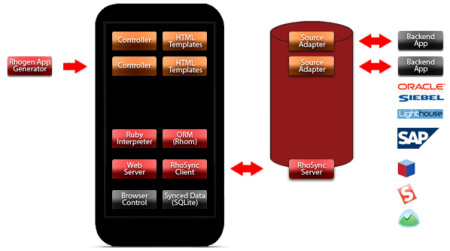Smartphone dev framework adds Bluetooth and calendar support
Oct 14, 2010 — by Eric Brown — from the LinuxDevices Archive — viewsRhomobile announced a new version of its cross-platform, native app development framework for smartphones, offering expanded Android support. The open source Rhodes 2.2 adds support for Bluetooth, native device calendar events, and “Android Cloud to Device Messaging,” says the company.
Rhodes supports the development of native apps on mobile devices including Android, RIM's BlackBerry, Symbian, Apple's iPhone and iPad, Windows Mobile, and HP/Palm's Linux-based WebOS, says Rhomobile. Developers can use Rhodes to write code once, and then start building apps for various smartphone platforms, claims the company.
The software is claimed to greatly reduce development time since developers can code in HTML, Javascript, and Ruby instead of in Objective-C or other complex native device languages. (See farther below for background on Rhodes.)
The new Bluetooth support fills in a major feature gap in Rhodes, enabling developer access to Bluetooth communications on a cross-platform basis. No details were supplied on supported versions or specific capabilities, however.
With Rhodes 2.2's new calendar support, developers can write native applications that access and create events in each smartphone operating system's native device calendar, says Rhomobile. The capability enables end users, for example, to add geolocation-linked events or notifications directly to their device calendars.
Rhodes developers can now write Android applications in HTML, Javascript, and Ruby that support Android's cloud-based push capabilities, says Rhomobile. With push support, the server is said to send requests to exchange updated application and user data with the smartphone app. Requests do not require the app to be open on the device, "ensuring data is always kept current," says the company.

Rhodes architecture
(Click to enlarge)
Rhomobile launched Rhodes 1.0 in March 2009 and followed up with Rhodes 2.0 in June of this year. Rhodes 2.0 added native mapping across devices, as well as a metadata framework for applications with changing underlying schema. It also improved integration with Rhomobile's open source RhoSync server framework (see diagram above).
Last month came version 2.1, adding barcode recognition, signature capture capability, and a version of jQTouch, said to be modified for optimal operation on Android. Combined with separate CSS stylesheets optimized for each smartphone OS, jQTouch can provide slick animated transitions between screens and other UI enhancements, says the company.
Stated Adam Blum, CEO of Rhomobile, "With Rhodes 2.2 we expand our support of native device capabilities, while making it easy to implement Android's efficient cloud-based push technology."
Availability
Rhodes 2.2 is now available for free under the MIT License. Ccommercial and enterprise licenses are also available. More information on Rhodes 2.2 may be found here, and here.
This article was originally published on LinuxDevices.com and has been donated to the open source community by QuinStreet Inc. Please visit LinuxToday.com for up-to-date news and articles about Linux and open source.